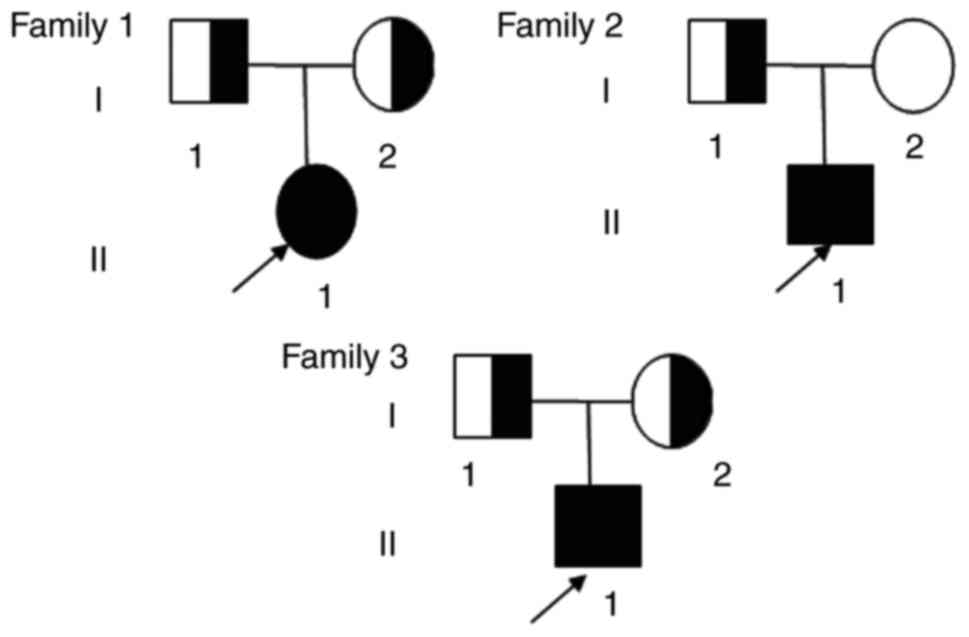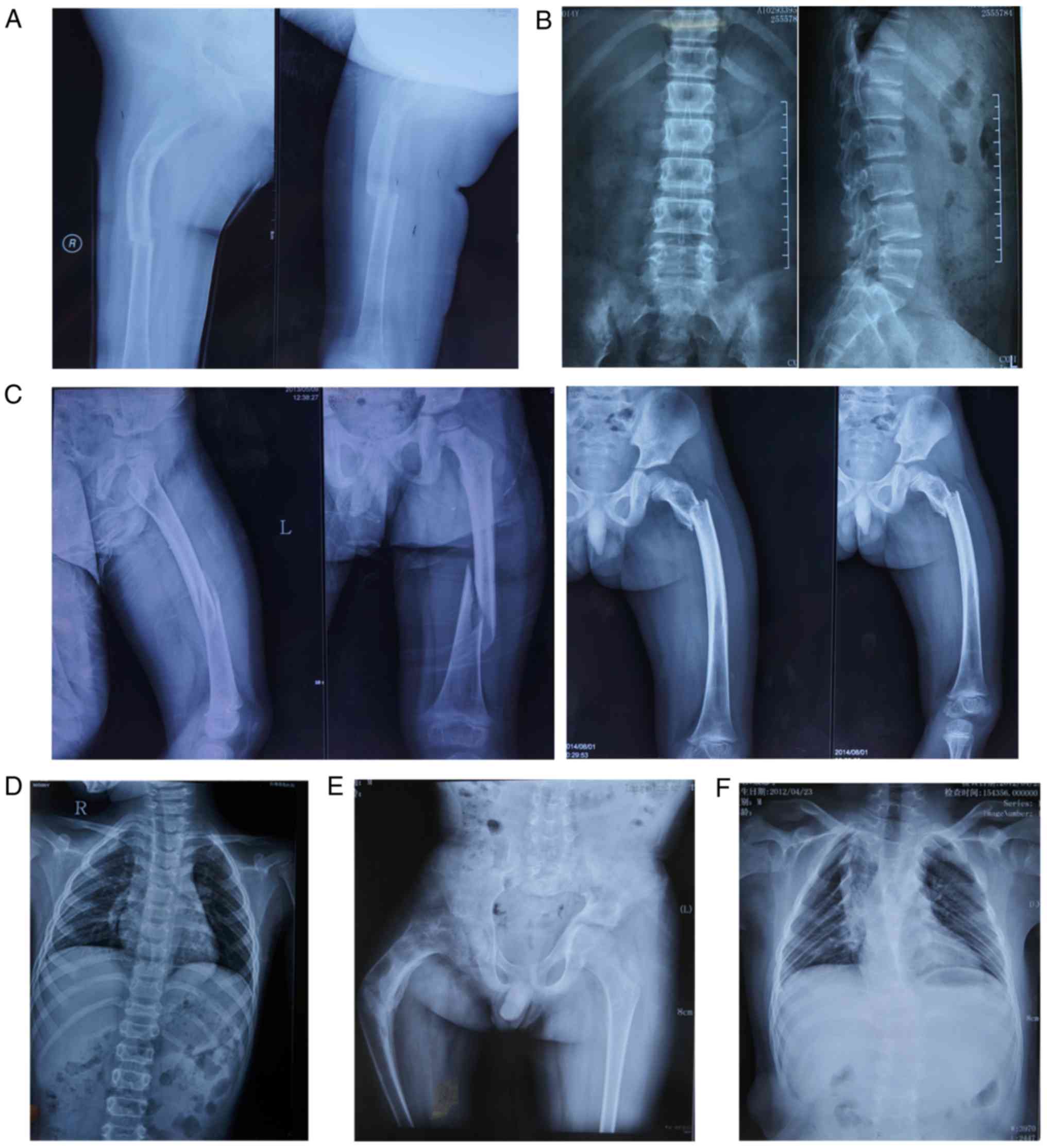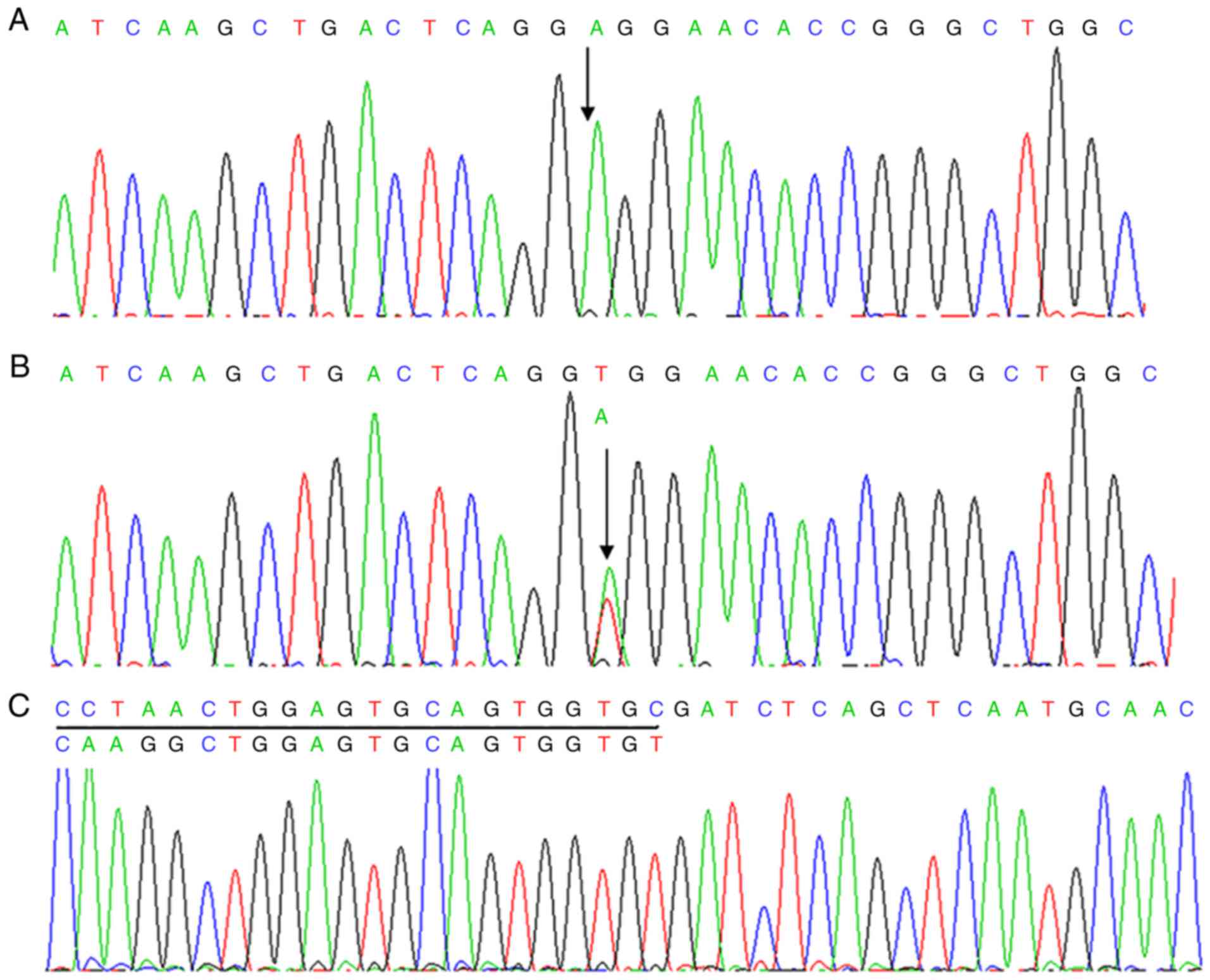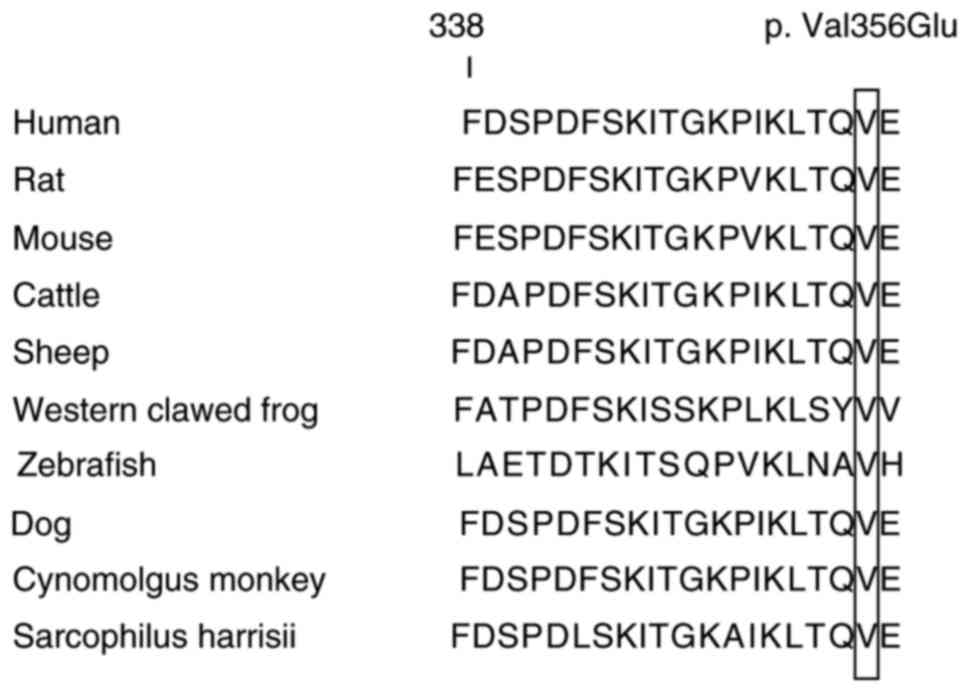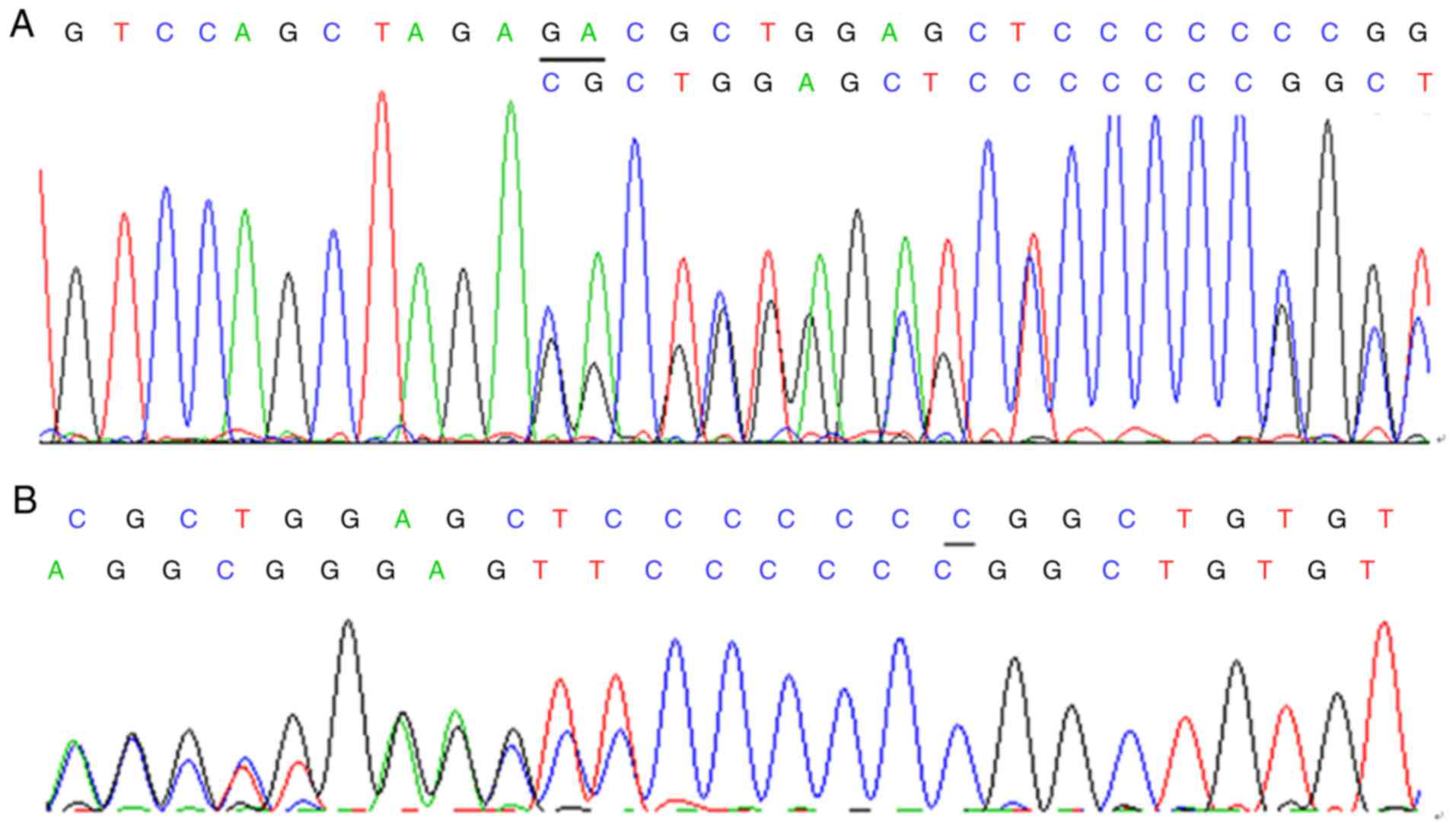|
1
|
Rauch F and Glorieux FH: Osteogenesis
imperfecta. Lancet. 363:1377–1385. 2004. View Article : Google Scholar
|
|
2
|
Sillence DO and Rimoin DL: Classification
of osteogenesis imperfect. Lancet. 1:1041–1042. 1978. View Article : Google Scholar : PubMed/NCBI
|
|
3
|
Cheung MS and Glorieux FH: Osteogenesis
imperfecta: Update on presentation and management. Rev Endoc Metab
Disord. 9:153–160. 2008. View Article : Google Scholar
|
|
4
|
Glorieux FH, Rauch F, Plotkin H, Ward L,
Travers R, Roughley P, Lalic L, Glorieux DF, Fassier F and Bishop
NJ: Type V osteogenesis imperfecta: A new form of brittle bone
disease. J Bone Miner Res. 15:1650–1658. 2000. View Article : Google Scholar : PubMed/NCBI
|
|
5
|
Glorieux FH, Ward LM, Rauch F, Lalic L,
Roughley PJ and Travers R: Osteogenesis imperfecta type VI: A form
of brittle bone disease with a mineralization defect. J Bone Miner
Res. 17:30–38. 2002. View Article : Google Scholar : PubMed/NCBI
|
|
6
|
Tucker T, Nelson T, Sirrs S, Roughley P,
Glorieux FH, Moffatt P, Schlade-Bartusiak K, Brown L and Rauch F: A
co-occurrence of osteogenesis imperfecta type VI and cystinosis. Am
J Med Genet A. 158A. pp. 1422–1426. 2012, View Article : Google Scholar
|
|
7
|
Becker J, Semler O, Gilissen C, Li Y, Bolz
HJ, Giunta C, Bergmann C, Rohrbach M, Koerber F, Zimmermann K, et
al: Exome sequencing identifies truncating mutations in human
SERPINF1 in autosomal-recessive osteogenesis imperfecta. Am J Hum
Genet. 88:362–371. 2011. View Article : Google Scholar : PubMed/NCBI
|
|
8
|
Alanay Y, Avaygan H, Camacho N, Utine GE,
Boduroglu K, Aktas D, Alikasifoglu M, Tuncbilek E, Orhan D, Bakar
FT, et al: Mutations in the gene encoding the RER protein FKBP65
cause autosomal-recessive osteogenesis imperfecta. Am J Hum Genet.
86:551–559. 2010. View Article : Google Scholar : PubMed/NCBI
|
|
9
|
Kelley BP, Malfait F, Bonafe L, Baldridge
D, Homan E, Symoens S, Willaert A, Elcioglu N, Van Maldergem L,
Verellen-Dumoulin C, et al: Mutations in FKBP10 cause recessive
osteogenesis imperfecta and Bruck syndrome. J Bone Miner Res.
26:666–672. 2011. View Article : Google Scholar
|
|
10
|
Valadares ER, Carneiro TB, Santos PM,
Oliveira AC and Zabel B: What is new in genetics and osteogenesis
imperfecta classification? J Pediatr. 90:536–541. 2014. View Article : Google Scholar
|
|
11
|
Zhang ZL, Zhang H, Ke YH, Yue H, Xiao WJ,
Yu JB, Gu JM, Hu WW, Wang C, He JW and Fu WZ: The identification of
novel mutations in COL1A1, COL1A2, and LEPRE1 genes in Chinese
patients with osteogenesis imperfecta. J Bone Miner Metab.
30:69–77. 2012. View Article : Google Scholar
|
|
12
|
Zhang H, Yue H, Wang C, Hu W, Gu J, He J,
Fu W, Hu Y, Li M and Zhang Z: Clinical characteristics and the
identification of novel mutations of COL1A1 and COL1A2 in 61
Chinese patients with osteogenesis imperfecta. Mol Med Rep.
14:4918–4926. 2016. View Article : Google Scholar : PubMed/NCBI
|
|
13
|
Wang JY, Liu Y, Song LJ, Lv F, Xu XJ, San
A, Wang J, Yang HM, Yang ZY, Jiang Y, et al: Novel mutations in
SERPINF1 result in rare osteogenesis imperfecta type VI. Calcif
Tissue Int. 100:55–66. 2017. View Article : Google Scholar
|
|
14
|
Zhou P, Liu Y, Lv F, Nie M, Jiang Y, Wang
O, Xia W, Xing X and Li M: Novel mutations in FKBP10 and PLOD2
cause rare Bruck syndrome in Chinese patients. PloS One.
9:e1075942014. View Article : Google Scholar : PubMed/NCBI
|
|
15
|
Zhang H, He JW, Gao G, Yue H, Yu JB, Hu
WW, Gu JM, Hu YQ, Li M, Fu WZ, et al: Polymorphisms in the HOXD4
gene are not associated with peak bone mineral density in Chinese
nuclear families. Acta Pharmacol Sin. 31:977–983. 2010. View Article : Google Scholar : PubMed/NCBI
|
|
16
|
Maynard LM, Guo SS, Chumlea WC, Roche AF,
Wisemandle WA, Zeller CM, Towne B and Siervogel RM: Total-body and
regional bone mineral content and areal bone mineral density in
children aged 8-18 y: The Fels Longitudinal study. Am J Clin Nutr.
68:1111–1117. 1998. View Article : Google Scholar : PubMed/NCBI
|
|
17
|
Lu HK, Zhang Z, Ke YH, He JW, Fu WZ, Zhang
CQ and Zhang ZL: High prevalence of vitamin D insufficiency in
China: Relationship with the levels of parathyroid hormone and
markers of bone turnover. PloS One. 7:e472642012. View Article : Google Scholar : PubMed/NCBI
|
|
18
|
Li R, Li Y, Kristiansen K and Wang J:
SOAP: Short oligonucleotide alignment program. Bioinformatics.
24:713–714. 2008. View Article : Google Scholar : PubMed/NCBI
|
|
19
|
Zhang Z, Xia W, He J, Zhang Z, Ke Y, Yue
H, Wang C, Zhang H, Gu J, Hu W, et al: Exome sequencing identifies
SLCO2A1 mutations as a cause of primary hypertrophic
osteoarthropathy. Am J Hum Genet. 90:125–132. 2012. View Article : Google Scholar :
|
|
20
|
Li Y, Vinckenbosch N, Tian G,
Huerta-Sanchez E, Jiang T, Jiang H, Albrechtsen A, Andersen G, Cao
H, Korneliussen T, et al: Resequencing of 200 human exomes
identifies an excess of low-frequency non-synonymous coding
variants. Nat Genet. 42:969–972. 2010. View
Article : Google Scholar : PubMed/NCBI
|
|
21
|
DePristo MA, Banks E, Poplin R, Garimella
KV, Maguire JR, Hartl C, Philippakis AA, del Angel G, Rivas MA,
Hanna M, et al: A framework for variation discovery and genotyping
using next-generation DNA sequencing data. Nat Genet. 43:491–498.
2011. View
Article : Google Scholar : PubMed/NCBI
|
|
22
|
Wang K, Li M and Hakonarson H: ANNOVAR:
Functional annotation of genetic variants from high-throughput
sequencing data. Nucleic Acids Res. 38:e1642010. View Article : Google Scholar : PubMed/NCBI
|
|
23
|
Shi Y, Li Y, Zhang D, Zhang H, Li Y, Lu F,
Liu X, He F, Gong B, Cai L, et al: Exome sequencing identifies
ZNF644 mutations in high myopia. PLoS Genet. 7:e10020842011.
View Article : Google Scholar : PubMed/NCBI
|
|
24
|
Livak KJ and Schmittgen TD: Analysis of
relative gene expression data using real-time quantitative PCR and
the 2−ΔΔCT method. Methods. 25:402–408. 2001.
View Article : Google Scholar
|
|
25
|
Morello R, Bertin TK, Chen Y, Hicks J,
Tonachini L, Monticone M, Castagnola P, Rauch F, Glorieux FH,
Vranka J, et al: CRTAP is required for prolyl 3-hydroxylation and
mutations cause recessive osteogenesis imperfecta. Cell.
127:291–304. 2006. View Article : Google Scholar : PubMed/NCBI
|
|
26
|
Barnes AM, Chang W, Morello R, Cabral WA,
Weis M, Eyre DR, Leikin S, Makareeva E, Kuznetsova N, Uveges TE, et
al: Deficiency of cartilage-associated protein in recessive lethal
osteogenesis imperfecta. N Engl J Med. 355:2757–2764. 2006.
View Article : Google Scholar : PubMed/NCBI
|
|
27
|
Willaert A, Malfait F, Symoens S, Gevaert
K, Kayserili H, Megarbane A, Mortier G, Leroy JG, Coucke PJ and De
Paepe A: Recessive osteogenesis imperfecta caused by LEPRE1
mutations: Clinical documentation and identification of the splice
form responsible for prolyl 3-hydroxylation. J Med Genet.
46:233–241. 2009. View Article : Google Scholar
|
|
28
|
van Dijk FS, Nesbitt IM, Zwikstra EH,
Nikkels PG, Piersma SR, Fratantoni SA, Jimenez CR, Huizer M,
Morsman AC, Cobben JM, et al: PPIB mutations cause severe
osteogenesis imperfecta. Am J Hum Genet. 85:521–527. 2009.
View Article : Google Scholar : PubMed/NCBI
|
|
29
|
Christiansen HE, Schwarze U, Pyott SM,
AlSwaid A, Al Balwi M, Alrasheed S, Pepin MG, Weis MA, Eyre DR and
Byers PH: Homozygosity for a missense mutation in SERPINH1, which
encodes the collagen chaperone protein HSP47, results in severe
recessive osteogenesis imperfecta. Am J Hum Genet. 86:389–398.
2010. View Article : Google Scholar : PubMed/NCBI
|
|
30
|
Lapunzina P, Aglan M, Temtamy S,
Caparrós-Martín JA, Valencia M, Letón R, Martínez-Glez V, Elhossini
R, Amr K, Vilaboa N and Ruiz-Perez VL: Identification of a
frameshift mutation in Osterix in a patient with recessive
osteogenesis imperfecta. Am J Hum Genet. 87:110–114. 2010.
View Article : Google Scholar : PubMed/NCBI
|
|
31
|
Li F, Song N, Tombran-Tink J and Niyibizi
C: Pigment epithelium derived factor suppresses expression of
Sost/Sclerostin by osteocytes: Implication for its role in bone
matrix mineralization. J Cell Physiol. 230:1243–1249. 2015.
View Article : Google Scholar
|
|
32
|
Homan EP, Rauch F, Grafe I, Lietman C,
Doll JA, Dawson B, Bertin T, Napierala D, Morello R, Gibbs R, et
al: Mutations in SERPINF1 cause osteogenesis imperfecta type VI. J
Bone Miner Res. 26:2798–2803. 2011. View Article : Google Scholar : PubMed/NCBI
|
|
33
|
Venturi G, Gandini A, Monti E, Dalle
Carbonare L, Corradi M, Vincenzi M, Valenti MT, Valli M, Pelilli E,
Boner A, et al: Lack of expression of SERPINF1, the gene coding for
pigment epithelium-derived factor, causes progressively deforming
osteogenesis imperfecta with normal type I collagen. J Bone Miner
Res. 27:723–728. 2012. View Article : Google Scholar
|
|
34
|
Caparrós-Martin JA, Valencia M, Pulido V,
Martínez-Glez V, Rueda-Arenas I, Amr K, Farra C, Lapunzina P,
Ruiz-Perez VL, Temtamy S and Aglan M: Clinical and molecular
analysis in families with autosomal recessive osteogenesis
imperfecta identifies mutations in five genes and suggests
genotype-phenotype correlations. Am J Med Genet A. 161A:1354–1369.
2013. View Article : Google Scholar : PubMed/NCBI
|
|
35
|
Cho SY, Ki CS, Sohn YB, Kim SJ, Maeng SH
and Jin DK: Osteogenesis imperfecta Type VI with severe bony
deformities caused by novel compound heterozygous mutations in
SERPINF1. J Korean Med Sci. 28:1107–1110. 2013. View Article : Google Scholar : PubMed/NCBI
|
|
36
|
Rauch F, Husseini A, Roughley P, Glorieux
FH and Moffatt P: Lack of circulating pigment epithelium-derived
factor is a marker of osteogenesis imperfecta type VI. J Clin
Endocrinol Metab. 97:E1550–E1556. 2012. View Article : Google Scholar : PubMed/NCBI
|
|
37
|
Steinlein OK, Aichinger E, Trucks H and
Sander T: Mutations in FKBP10 can cause a severe form of isolated
Osteogenesis imperfecta. BMC Med Genet. 12:1522011. View Article : Google Scholar : PubMed/NCBI
|
|
38
|
Shaheen R, Al-Owain M, Sakati N, Alzayed
ZS and Alkuraya FS: FKBP10 and Bruck syndrome: Phenotypic
heterogeneity or call for reclassification? Am J Hum Genet.
87:306–307; author reply 308. 2010. View Article : Google Scholar : PubMed/NCBI
|
|
39
|
Schwarze U, Cundy T, Pyott SM,
Christiansen HE, Hegde MR, Bank RA, Pals G, Ankala A, Conneely K,
Seaver L, et al: Mutations in FKBP10, which result in Bruck
syndrome and recessive forms of osteogenesis imperfecta, inhibit
the hydroxylation of telopeptide lysines in bone collagen. Hum Mol
Genet. 22:1–17. 2013. View Article : Google Scholar :
|















